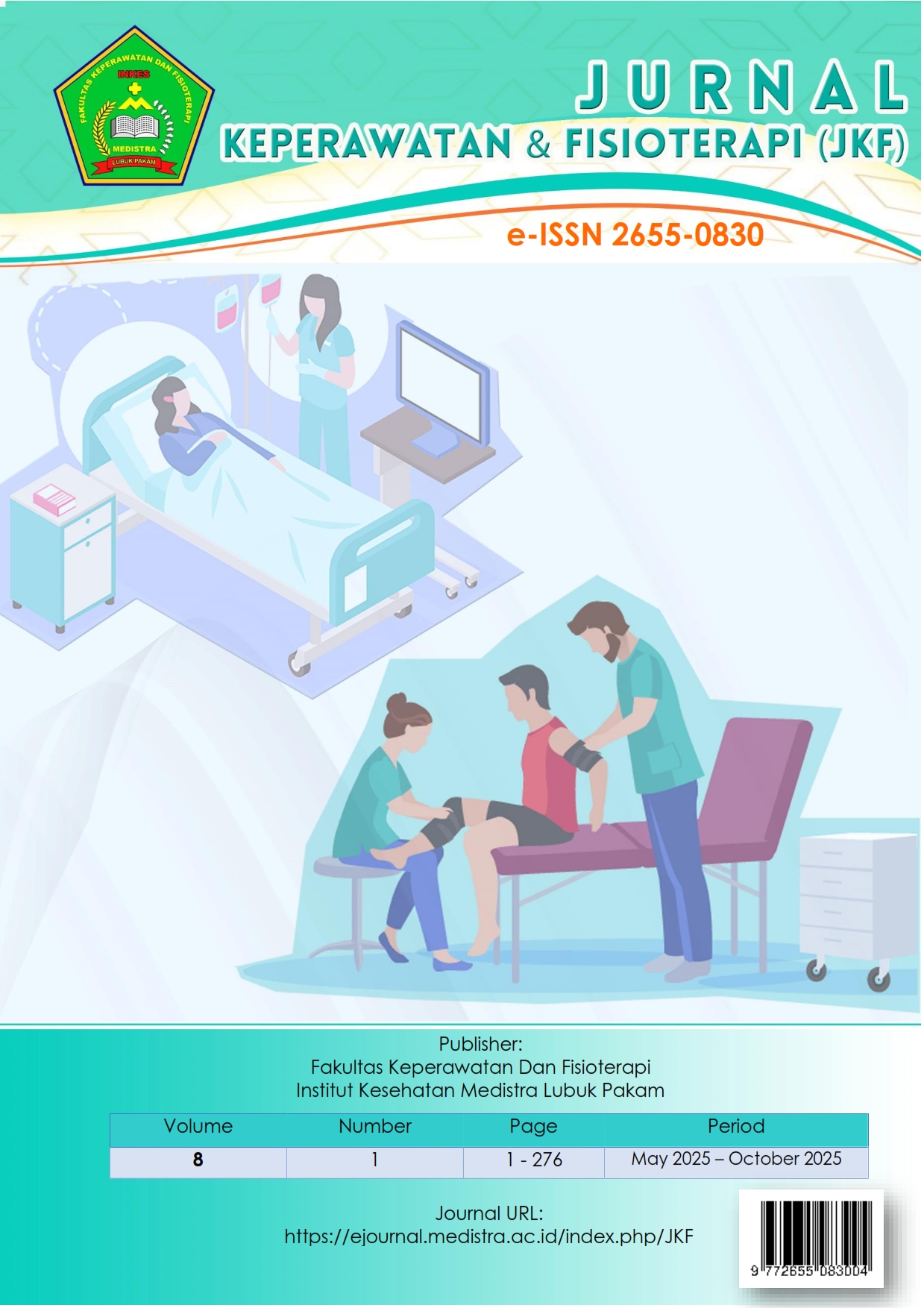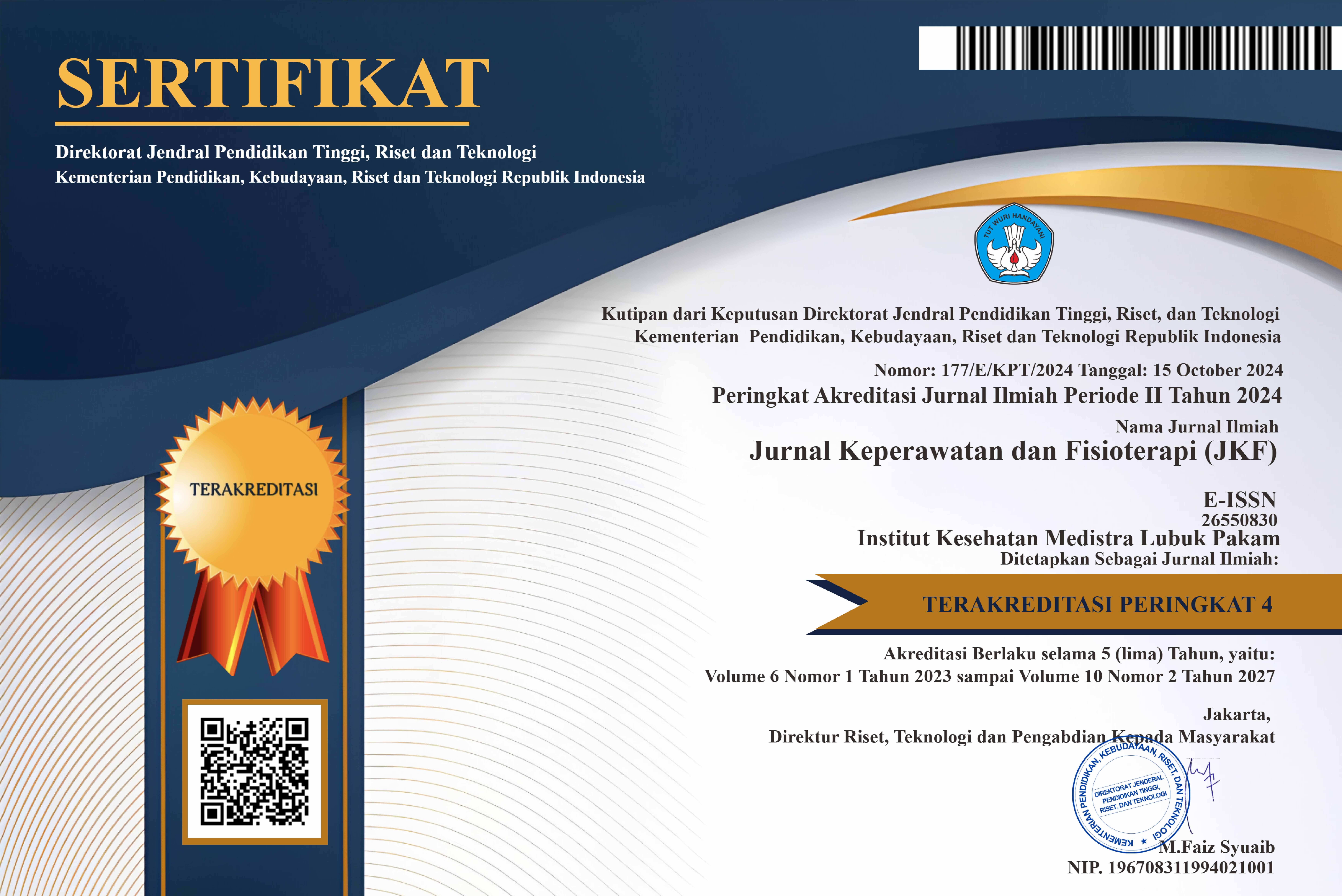The Relationship Between Self-Esteem and Family Support with Social Isolation in Patients with Diabetes Mellitus at Puskesmas Deli Tua
DOI:
https://doi.org/10.35451/b5zq5n98Keywords:
self-esteem, family support, social isolation, diabetes mellitusAbstract
Individuals with chronic illnesses, particularly diabetes mellitus, often encounter psychological challenges such as a tendency toward social isolation. Several factors contribute to this condition, including self-esteem and the level of family support. This study aimed to examine the relationship between self-esteem and family support with social isolation among patients with diabetes mellitus at Deli Tua Health Center. An analytical research design with a cross-sectional correlational approach was employed. A total of 54 respondents were selected using simple random sampling. Data were collected through structured questionnaires and analyzed using the Chi-Square test. The findings revealed a significant association between self-esteem and social isolation (p = 0.000; < 0.05). These results indicate that individuals with higher self-esteem are less likely to experience social isolation.. This confirms that psychological resilience plays an important role in maintaining social functioning amid chronic illness. In conclusion, self-esteem serves as a key factor in reducing social isolation among patients with diabetes mellitus. Therefore, efforts to improve self-esteem through psychosocial support and nursing interventions should be prioritized to prevent social withdrawal in these patients.
Downloads
References
[1] Atuh, R., Siregar, L., & Manurung, D. (2023). Hubungan harga diri dengan distress pada pasien diabetes melitus. Jurnal Psikologi Kesehatan, 12(2), 101–109. https://repo.polkesraya.ac.id/3075/
[2] Diabetes Research and Clinical Practice. (2025). Loneliness and Social Isolation as Risk Factors for Type 2 Diabetes Onset: A Systematic Review and Meta-analysis. Retrieved from https://researchers.unab.cl
[3] Hilyah, D., Kuswinarti, & Ramadhanti, J. (2025). Family Support in Adherence to Oral Anti-Diabetic Medications among Patients with Type 2 Diabetes Mellitus. Althea Medical Journal, 12(1), 22–27. https://journal.fk.unpad.ac.id
[4] International Diabetes Federation. (2024). IDF Diabetes Atlas (11th ed.). Brussels: IDF. https://www.idf.org
[5] Investigating the Relationship between Social Stigma and Treatment Adherence in Type 2 Diabetes Patients at Healthcare Centers in Northwest Iran. (2025). BMC Public Health, 25(815). https://doi.org/10.1186/s12889-025-22014-w
[6] Jati, Y. A. S., Setyaji, D. Y., & Purnawijayanti, H. A. (2024). The Effect of Family Support in Nutrition Education on Dietary Adherence and Blood Glucose Levels of Type 2 Diabetes Mellitus Inpatients at Panti Rapih Hospital Yogyakarta. Journal of Global Nutrition, 4(2). https://jurnal.isagi.or.id
[7] Montol, A. B., Pascoal, M. E., Ringkuangan, M., Soenjono, S. J., Imbar, H. S., & Harikedua, V. T. (2025). Family Support and Compliance with Diabetes Mellitus Management on Blood Glucose in the Elderly Prolanis Club at Tompaso Public Health Center. International Journal of Advanced Multidisciplinary Research and Studies, 5(5). https://www.multiresearchjournal.com
[8] NCD Risk Factor Collaboration. (2022). Worldwide trends in diabetes since 1990: A pooled analysis of 800 population-based studies. The Lancet, 400(10355), 1136–1150.
[9] Nightingale, S., Brown, J., & Lee, H. (2024). Self-esteem, diabetes distress, and social support as predictors of self-efficacy in patients with type 2 diabetes. Journal of Health Psychology, 29(4), 556–567.
[10] Nightingale, C. M., Brown, M., & Harris, K. (2024). Family support, self-esteem, and diabetes distress: Pathways to social functioning in adults with diabetes. Diabetes Research and Clinical Practice, 205, 110-119.
[11] Pane, A., Siregar, D., & Lubis, H. (2024). Family support and quality of life in patients with diabetes mellitus. Indonesian Journal of Nursing and Health Sciences, 15(2), 112-120.
[12] Prell, T., et al. (2023). Social exclusion in people with diabetes: Cross-sectional study. Scientific Reports, 13(1), 8452. https://doi.org/10.1038/s41598-023-33884-8
[13] Putra, I., & Andayani, R. (2023). Social support theory and its implications for chronic disease management. Journal of Health Psychology Research, 8(1), 44-53.
[14] Rusdi. (2020). Diabetes melitus: Konsep dan penatalaksanaan keperawatan. Jakarta: Penerbit Kesehatan Nusantara.
[15] Setyoadi, S., Mudianti, J. F., Nifangelya, P., Ramadhania, L., & Ismail, D. D. S. L. (2025). Family Support in the Care of Patients with Type 2 Diabetes Mellitus: A Scoping Review. Journal of Nursing Science Update (JNSU), 13(1), 37–46. https://jik.ub.ac.id
[16] Song, Y., et al. (2023). Social isolation, loneliness, and incident type 2 diabetes: Findings from a large prospective study. BMC Public Health, 23(1), 1762. https://doi.org/10.1186/s12889-023-16684-3
[17] Wang, J., Chen, Y., & Zhang, L. (2025). Social isolation in older adults with type 2 diabetes mellitus: The role of family support and self-perception. Frontiers in Public Health, 13, 1562186. https://doi.org/10.3389/fpubh.2025.1562186
[18] Wicaksana, A. L., et al. (2025). Prevalence and risk factors for loneliness among individuals with diabetes: A systematic review and meta-analysis. Systematic Reviews, 14(52), 1–15. https://doi.org/10.1186/s13643-025-02850-y
[19] World Health Organization. (2024). Global report on diabetes. Geneva: WHO. https://www.who.int
[20] Zhang, L., Chen, Y., & Wu, X. (2025). Social support, loneliness, and psychological resilience among elderly with diabetes in China. BMC Geriatrics, 25(1), 77-86.
Downloads
Published
Issue
Section
License
Copyright (c) 2025 Zuliawati, Rostiodertina Girsang, Rasninta Devi Ansela, Lidya Arni Januarita Simbolon

This work is licensed under a Creative Commons Attribution 4.0 International License.
Copyright in each article is the property of the Author.


























